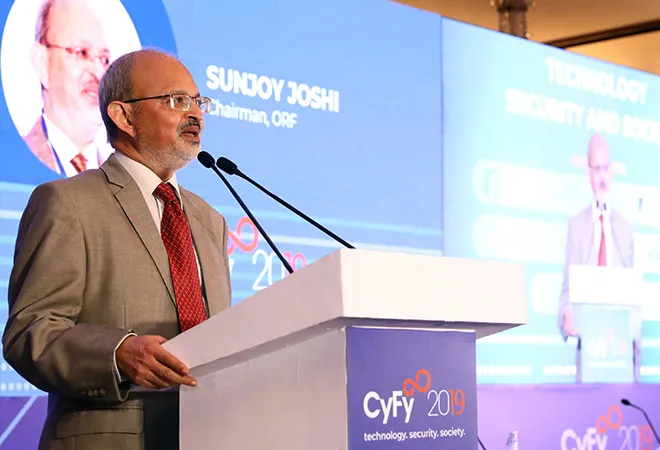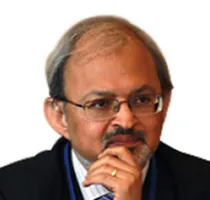
It gives me great pleasure to welcome Shri Ravi Shankar Prasad, Hon’ble Minister for Law & Justice, Communications and Electronics & Information Technology, a person who has been part of CyFy since its inception to this ninth edition of CyFy.
We meet this time in the midst of a distinct upheaval in the relationship between technology, us as individuals and the societies we inhabit.
When the internet began at its core lay an open, decentralised, in many ways nihilistic and anarchic, communication system resembling something like the Wild West. It was this vast open wild landscape within which the individual was to feel empowered, liberated autonomous.
But the wild open landscapes first began giving way to walled gardens, which got bigger and bigger until they stretched across frontiers. Then came the inevitable fortifications and bastions across the frontiers as nation states started re-asserting their dominion. Today we are staring at the distinct possibility of seeing an iron curtain drawn across this space threatening to split it into distinct and different techno-spheres. Staring at a technology future that makes the threat of a splintered and divided world wide web very real.
Sir, six years ago when we curated our first edition of CyFy, the cyber world by comparison seemed simpler. We were discussing managing the infrastructure of the internet. Even as we did make some progress, the internet and associated technologies have come in the eye of a storm of major political, economic, social and strategic upheavals.
In a world where information has always meant power, every milestone in communication technology shortened what Ben Bagdikian called the information gap, the time between an event occurring and the dissemination of information about that event. The printing press speeded up the spread of knowledge and information, moulding public opinion in a way that nothing before it or after it could rival, until the advent of radio and television in the twentieth century. Fifty years later, digital technologies ended up completely eliminating the information gap making information available instantaneously. The Gutenberg Press did cause political and social upheaval that ultimately led to the demise of the political power of the Church and the feudal aristocracy.
Therefore, today, if there are contests around the principles of how this instantaneous flow of information is to be regulated, we should hardly be surprised.
CyFy in many ways is a platform that mimics the internet in its pristine prime. It is designed to be owned and curated by multiple stakeholders and partners — as an open space for conversations across the many divides fracturing this space today. It attempts to explore whether there is room for a new dynamic whereby a new digital collective can yet emerge.
And Mr. Minister the six pillars around which this Conference is designed explore some of the most important questions we will address over the next two days:
First, how do open societies manage risks arising from the manipulated flow of information designed to fragment the public sphere? How to prevent misinformation from sabotaging democratic institutions?
Second, advances in AI and machine learning promise of immense advantages not just for commerce but also our ability to ensure basic human needs of health, education and access to all. But deep learning algorithms mirror the social biases and prejudices inherent in humans who create them, codifying discrimination based on gender, race or caste into AI systems. What processes need to be in place for the early detection and mitigation of such undesirable anomalies?
Third, digital technologies have helped to resurrect many forgotten art forms, propelled many a local artist instant stardom. They have enabled communities to re-assert their cultural, normative and intellectual identities; How does one prevent a dominant set of platforms and formats steam rolling this multiplicity into uniformity by shaping our understanding of who we are and what we must strive to be?
Fourth, “Geo-Tech” is become the buzz-word in strategic discourse. Will the hyphenation of emerging technologies with national security continue to exacerbate friction in the international system?
Fifth, in this period of flux, how should states encourage interdependence of technological sub-systems while guarding sovereignty in managing social consequences? How to bring stability in a world that is connected by technology but is self-serving by impulse?
And finally, how does one conceptualise regulation and policy making in a place as open as cyberspace? On one side the scale and velocity of instantaneous information demands instantaneous attention — what new institutions or governance structures can respond effectively to this imperative?
None of these have easy answers.
Of the over 130 experts from nearly 40 countries, including 10 cyber-ambassadors and government representatives, gathered in this room there may be some who hold the keys to some of the answers. More important, many others hold the knowledge that will help us uncover the nuances, the different facets of these debates that will lead us to a far deeper understanding of the issues over the next two days.
But to get these discussions under way we have in Minister Ravi Shankar Prasad the most appropriate speaker to kick-off this forum.
Sir, you spearhead this governments mission to build through ‘Digital India’ — a society that is premised on inclusion, development and social mobility for all. These efforts have deservedly landed you in the list of the world’s 100 most influential people in the world of digital governance.
In these troubled digital times, it is always comforting to know that the country has in the Minister Communications and Electronics & Information Technology one who continues to remain optimistic about our tech futures. Continues to bring to bear his immense experience as a minister and political leader of nearly two decades of service to people to this task and is determined to create institutions and frameworks that are forward looking and meant for the next generation to benefit from and build upon.
Minister Prasad, may I please request you to address us.
The views expressed above belong to the author(s). ORF research and analyses now available on Telegram! Click here to access our curated content — blogs, longforms and interviews.




 PREV
PREV


